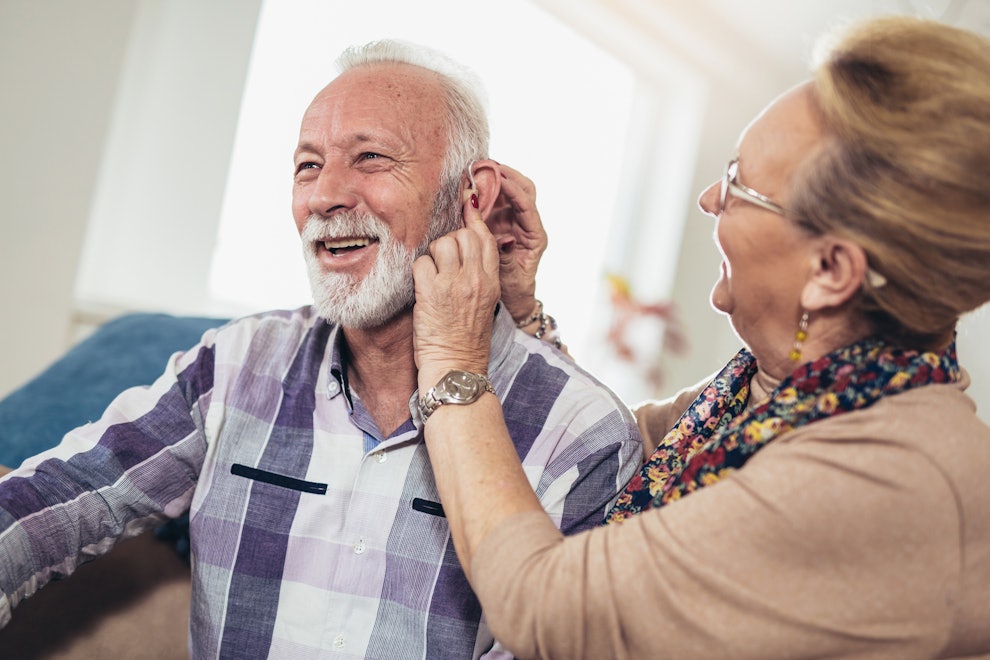Article at a glance
Hearing loss is common as you age, with up to 50% of all adults over the age of 75 living with mild to moderate hearing loss.
Signs of hearing loss include muffled sounds, an inability to hear conversations, asking people to repeat themselves, turning up the volume, and ringing in the ears.
Age-related hearing loss can be hereditary, making some people more likely to experience it if it runs in their families.
Hearing aids can amplify sounds and make it easier to hear — for those with some hearing loss.
An ear, nose, and throat doctor or audiologist can perform a hearing aid test and diagnose hearing loss.
Hearing aids are available for purchase over the counter for anyone 18 or older.

The risk of losing some of your hearing increases as you age. While just 2% of adults ages 45 to 54 have disabling hearing loss, the percentage rises as you get older. About 25% of adults ages 65 to 74 and 50% of adults over 75 have hearing loss, according to the National Institute on Deafness and Other Communication Disorders. Understanding hearing aids, how hearing aids work, and how to diagnose hearing loss are important as you age. Fortunately, hearing aids can help you manage any age-related hearing loss and help you live a full life. Read on to learn more about hearing loss and different types of hearing aids.
Signs of Hearing Loss
Hearing loss related to aging typically occurs gradually over time. So, given that it’s often a slow process, it may be hard to pinpoint the early stages of hearing loss. However, being aware of the common signs of hearing loss can make it easier for you to identify any potential issues and even answer the question “Do I need a hearing aid?”. Check out these common signs of hearing loss:
Muffled sounds that are difficult to distinguish
Asking people to repeat themselves
Difficulty hearing conversations, especially in loud settings
Turning up the volume on the radio or TV louder than usual
Difficulty hearing high-pitched sounds
Ringing in the ears
Fluid or a feeling of pressure in the ears
Having trouble carrying on a conversation on the phone
If you begin to notice one or more of these signs, it might be time to schedule a hearing aid test to check your hearing.
Aging, Hearing Loss, and Hearing Aids
Hearing can worsen as you age. Age-related hearing loss is known as presbycusis and comes on gradually. It can be hereditary, so if other older adults in your family have hearing loss, you might be more likely to experience it, too. This type of hearing loss usually occurs in both ears, another sign that it might be related to your age. Some conditions, such as high blood pressure or diabetes, are common in older people and can contribute to hearing loss.
While there isn’t currently a way to prevent age-related hearing loss, you can reduce its impact on your life with the use of hearing aids. These electronic devices can improve your hearing and make it easier for you to carry on conversations and interact with others. Hearing aids are worn in or outside of the ear and work to make sounds louder.
Getting Your Hearing Aids

A hearing aid test helps determine the extent of your hearing loss. Typically, you’ll see an ear, nose, and throat (ENT) doctor to test your hearing and determine your type and amount of hearing loss before being fitted for hearing aids. However, seeing a doctor before getting hearing aids is not required. The Food and Drug Administration (FDA) allows the purchase of hearing aids over the counter to anyone age 18 or older with mild to moderate hearing loss. Still, it might be easier for you to find the right hearing aids for your needs under the guidance of a doctor or audiologist.
When you’re ready to purchase hearing aids, consider several factors, including whether you want an inner-ear or behind-the-ear design. You’ll also want to evaluate the features of the hearing aid, read reviews, and learn about its maintenance and warranty before making your purchase. You might also want to check if there is a trial period, which gives you the chance to return them if they don’t suit you. If you’re unsure about what type of hearing aid to purchase, an audiologist can answer any questions and make recommendations specific to your hearing needs.
Once you get your hearing aids, you may have an adjustment period when getting used to them. An audiologist can help you with your new device if you hear a whistling sound, experience feedback, or hear background noise.
How do hearing aids work?

Hearing aids magnify the sound vibrations in your ear to help you hear those sounds better. They’re made up of three parts: a microphone, an amplifier, and a speaker. The microphone receives the sounds and converts them into electrical signals that are then sent to the amplifier. The amplifier then increases the electrical signals and sends them to your ear through the speaker, allowing you to hear sounds more clearly. Hearing aids operate on battery power.
If you’ve noticed that your hearing isn’t as good as it once was, you’re not alone. Hearing loss is common among older adults, especially those age 75 and older, but hearing aids can help. An ENT or audiologist can diagnose your hearing loss and recommend the right hearing aids for your unique needs. Once you find the right hearing aids for you, you’ll be able to enjoy improved hearing and easier conversations with family and friends. So, pay attention to any signs of hearing loss that you may be experiencing, and talk to your doctor or an audiologist about your concerns.
Sources
- https://www.nidcd.nih.gov/health/statistics/quick-statistics-hearing#:~:text=About%202%20percent%20of%20adults,older%20have%20disabling%20hearing%20loss.
- https://my.clevelandclinic.org/health/diseases/17673-hearing-loss
- https://www.nia.nih.gov/health/hearing-loss-common-problem-older-adults#:~:text=Presbycusis%2C%20or%20age%2Drelated%20hearing,hear%20what%20others%20are%20saying.
- https://www.nidcd.nih.gov/health/age-related-hearing-loss
- https://www.nidcd.nih.gov/health/hearing-aid
Become a patient
Experience the Oak Street Health difference, and see what it’s like to be treated by a care team who are experts at caring for older adults.



